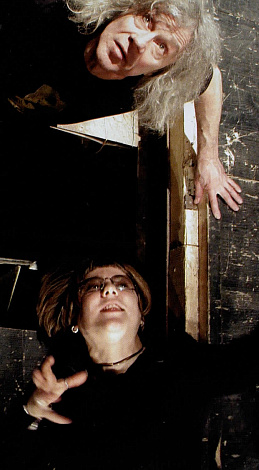Olga Subbotina was born in Moscow. In 1997 graduated fr om director's faculty of RATI (workshop of Leonid Kheifets). In 1997 she directed "Two Less" by E. Narshi at the Debut-Centre. In 1998 she participated in the creation of the Centre for Drama and Directing under the direction of A. Kazantsev and M. Roshchin (currently she is assistant to the artistic director of the Centre) wh ere she has staged the productions ‘Shopping and F***’ by M. Ravenhill (1999), ‘Sensation of a Beard’ by K. Dragunskaya (2001), ‘SET-2’ and ‘Hollow’ by the Presniakov Brothers (within the framework of the project 'Moscow - Open City’), ‘Venetian Night' by A. de Musset (2001). Among other productions: 'Brothers and Liza’ by A. Kazantsev at the PANTA Theatre (Cannes, France), 'Little Tragedies’ by A. Pushkin at the Lunacharsky Drama Theatre (Penza) etc. Since 1998 she has participated in projects of the International Confederation of Theatre Unions as assistant director to Peter Stein for ‘Hamlet’ and to Declan Donnellan for ‘Boris Godunov’. Subbotina’s shows are recurrent participants of many Russian and international theatre festivals, festivals of modern drama, festivals of young drama at Liubimovka and so forth. In 2000 she has directed the television serial ’The Hole' based on Kuprin. She organized the festival ‘Invasion 2002’.
The play of the young Austrian playwrights A. Sauter and B. Studlar «А. is Another» is about love. About a thoughtful understanding of this feeling, about comprehension of the seif as an object and subject of love. At its heart lies the conflict between Romeo and Juliet, which was so wonderfully formulated by A. Efros: 'who loves more’. It is wonderful that the play, written by young authors apparently belonging to a cynical generation, investigates in such a quivering and fine manner the pure relationship between man and woman, husband and wife, in a way that is untainted by fashionable trends. The play continues the traditions of French art cinema a la ‘Man and Woman’ or ‘Love Mood’ by Wong Kar Wei. He loves her, she (the name of the heroine is not deciphered in the play, everyone calls her A.) understands that she has ceased to experience pleasure from her love for him everv second. Maximaikm in love and overestimated emotional demands on herself force her to annihilate herself, disappear from normal life. Because of a fatal concurrence her husband receives a police notice and her scorched remains. Self-burning. In a bag found next to the body there are fragments of letters to him: an explanation why she had to leave. She does not love him any more. She cannot live without loving absolutely, with every cell of her body, from the depth of her soul. The letters are read unequivocally as notes in agony written by somebody about to commit suicide. He is shocked. The heroine's elderly father and her friends are also shocked. How can the death of a loved person be taken adequately? How can he learn to live without her? How can he forget the pain? The play is saturated with memoirs of life with her, and through recollections of the wife who has left, the girlfriend, the daughter, the characters find in themselves more and more love, compassion, and courage. They learn to live without her and to appreciate each other; gaining something within themselves, they triumph over death
Oliga Subbotina/div>

